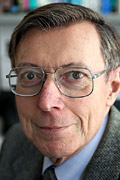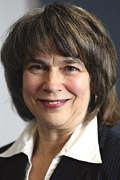James Evans left graduate school as a chemist, but has worn numerous hats during his 45-year Lawrence University teaching career, among the longest tenures in the college’s history.
Evans, professor of chemistry and computer science, along with Professor of Music Ernestine Whitman, will be recognized Sunday, June 5 as retiring faculty with professor emeritus status at Lawrence’s 162nd commencement. Both will receive honorary master of arts degrees, ad eundem, as part of the graduation ceremonies that begin at 10:30 a.m. on the Main Hall green.

A native of Bridgton, Maine, Evans joined the Lawrence faculty in 1966 as a 25-year-old with a Ph.D. from Princeton University. Unbeknownst to him, his first-year roommate from graduate school had turned down a two-year appointment at Lawrence, but Evans wound up with a three-year tenure track offer from then-President Curtis Tarr.
Blaming an inability “to convincingly say no,” Evans began multitasking in 1979 when he traded some of his chemistry teaching duties for responsibilities as part-time director of Lawrence’s small computer services group, a dual role he juggled for more than 15 years.
He was a natural choice as computer services director having already helped usher in the first computer-related teaching to the Lawrence curriculum by collaborating with members of the physics department on a laboratory computing course.
An interest in using computers beyond numerical work or signal processing also led Evans to write a text formatting program. With a physics colleague he co-directed a multi-year (1978-82) National Science Foundation-funded project that helped established today’s interdisciplinary mathematics-computer science major.
“Things happen to us as we go along,” Evans said of his evolving role.
Associate Professor of Computer Science Kurt Krebsbach has known Evans from the perspective of former student and current faculty colleague. He fondly remembers Evans’ gentle guidance when he spent two summers as a student working in Lawrence’s new computer lab.
“He instilled in me a sense that the moments of most rewarding insight came as a result of careful, thorough and unhurried thought,” said Krebsbach, a 1985 Lawrence graduate and member of the faculty since 2002. “Jim always exemplified the patient, deep thinker, confident that time and focused attention would produce the spark needed to solve the present problem.”
Beyond teaching chemistry and computer science, Evan served as an institutional “sidewalk superintendent,” assisting with the planning and execution of a variety of campus building projects, including the construction of Thomas Steitz Hall of Science and Hiett Hall and major remodeling projects in Main Hall and Youngchild Hall.
“You find yourself asking how do you get your head wrapped around all of these different things,” said Evans, reflecting upon his various responsibilities and the breadth of his scholarship, from nuclear science at Princeton to the biosciences during sabbaticals at England’s Oxford and Birmingham universities to two books he’s written on computer architecture.
Like all dedicated teachers, Evans points to what he calls “the assortment of students who pass by” as the thing he will miss the most as he leaves the classroom.
“They don’t know what’s impossible yet,” he says of the students, “so if you ask them to try hard, they may accomplish more than they or you intended. It’s always nice to see ‘the light’ turn on. Sometimes it’s subtle and not a blaze of glory, but it does happen.”
Near-term plans have Evans splitting time between Appleton and Maine, where he wants a generations-old family homestead near idyllic Moose Pond to be rescued from deterioration.
“Moveover, I just may join a Maine historical society because I’m historic,” said Evans.
Whitman might be the only person on the planet with custom-made nunchucks crafted from two piccolos. And there is nothing more appropriate to represent two of the things that have meant the most to her — music and the martial arts.

Among her professional and personal accomplishments are 33 years leading the Lawrence Conservatory of Music flute studio and earning a black belt in Tae Kwon Do at age 62. The nunchucks, a gift from a student, serve as tangible proof that the bonds Whitman formed with her students included life lessons as well as musical ones.
“She offered to her students that great Lawrence faculty model of artist/scholar/teacher; a dedicated musician, a brilliant mind, and a compassionate and caring person and teacher,” said Terri Sundberg, a 1983 Lawrence graduate. “She was my first real mentor in terms of how to approach the instrument and even more importantly how to approach being a true musician.”
Former students also praise Whitman’s willingness to go the extra mile, pushing them to be their best. She championed “practice buddies,” pairing a freshman with an upper-class student to play together and encourage camaraderie among the different classes.
“Because of her encouragement of a supportive studio atmosphere, the Lawrence flute studio became my best friends and second family,” said 2009 Lawrence graduate Sheri Muneno. “In fact, current studio members call themselves a ‘flamily’ — flute+family.”
Whitman, who joined the Lawrence faculty in 1978, began her flute career at age 20 when she won an audition for the Atlanta Symphony Orchestra, with which she performed at Carnegie Hall, the Lincoln Center for the Performing Arts and the Kennedy Center for the Performing Arts.
Her performing career was put on hold in 1986 when she developed the neurological condition focal dystonia, which affected the muscles in her left hand. After years of rehabilitation, she returned to performing in 1992, but developed focal dystonia in her lip in 2006, ending her career as a performer. Despite that setback, her passion never wavered.
“She taught me to listen to myself and learn from my mistakes,” said Ruth Washington Mayhew, a 1984 graduate. “Basically, she taught me how to teach myself. And that lesson has proved more valuable than I can say. It made me more introspective and aware — and has certainly helped me to become a much better teacher in the process.”
Regarding her 33-year teaching career at Lawrence, Whitman said she relished a job that was always interesting, challenging and rewarding.
“One of the things I will miss most is the thrilling moment when, after months of working on tonal exercises, a student produces a sound of great depth and beauty,” said Whitman, who was recognized with Lawrence’s Young Teacher Award in 1984. “That ‘aha’ moment never failed to make my skin tingle. The relationship between studio teacher and student is a very close one, and I shall dearly miss getting to know these wonderful students.”
Whitman’s plans for next year include volunteer work for various organizations, further martial arts trading, teaching Freshman Studies at Lawrence and several writing projects.